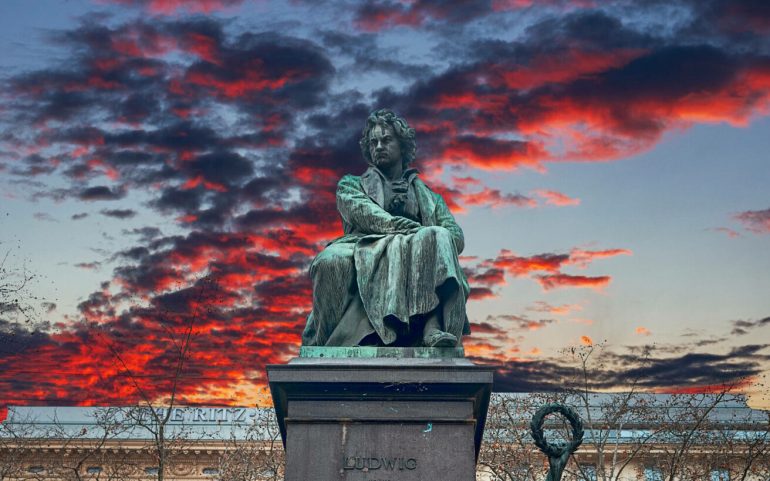Those who found such days 196 years ago at the imposing Karntnertor Theater in Vienna were lucky enough to enjoy one of the most famous songs never written down - perhaps the most important thing man has ever composed. The spectators were ecstatic. The elaborately combined notes reached their ears in the form of sound waves.
The only one who couldn't enjoy them was the 54-year-old composer and conductor himself that night. Ludwig van Beethoven, for the simple reason that. he had completely lost his hearing. What was happening was amazing. He had written the famous "Ninth Symphony" without listening (!) And now, on Monday, May 7, 1824, he was delivering it to the public, calling for it to be judged.
That night “o composer he stood upright on the podium and turned the scores by shaking his hands. The musicians, notified from a very early age, did not look at him. Their eyes were fixed on the conductor and the chief musician, as Beethoven did not hear the slightest sound. The movements of his hands did not serve anything ", writes the author - biographer George Drossos in the book" L. B. Beethoven - Life, work, his time "(Zacharopoulos publications).
As soon as it was over, those present in the room burst into endless applause and applause. The great teacher, however, continued to have his back turned to the frantic audience. He didn't understand anything. The 20-year-old high-pitched Carlin Unger walked over to him and turned to the audience to see what was happening.
According to a witness, "people applauded him for five minutes, while hats and scarves were thrown in the air. They raised their hands so that Beethoven, who could not hear, could at least see the acceptance he had. " In fact, he received five bizarres from the audience (again calls to the stage for applause, that is), which caused a stir, as similar prices were provided only for the king who again in his public appearances did not receive more than three.
The composition of the Ninth Symphony in minor, began to be written in 1817, but its main volume was imprinted on the staff from the autumn of 1822 onwards. In the first three parts ("Allegro ma non tropo, un poco maestoso", "Molto Vivace" and "Adagio molto e cantabile") he did not face any particular difficulties, but the fourth ("Presto… Prestissimo") made it quite difficult, since no one before him he had not introduced choral parts in an agreement (in the fourth and last part there is a choir that recites verses from the poem "Ode to Joy", by his compatriot Friedrich Schiller).
Completion of such a composition could not be accomplished in time, as the teacher was forced to suspend his work for various reasons, dealing with other urgent matters or even with new projects. For him it was a common tactic.
Apart from that, however, the composer's health, which presents problems, also played a significant role in the completion of a project. In addition to chronic headaches and colic, this time he felt a general lethargy, while at the same time his eyesight was weakening. His doctors had advised him to avoid candlelight, that is, not to work at all at night, but only under abundant natural light. It was something that as long as he lived in Vienna he could not follow strictly, since in the evenings he was given the opportunity to concentrate undisturbed and write his masterpiece. Friends who met him in 1825 spoke of an old and frustrated man, ready to collapse.
And yet, it was then that Beethoven, in a state of true repentance, set to music the finale of the Ninth Symphony, the Ode to Joy. The lyrics of the famous ode, first published in 1786, made him feel the need to praise this beautiful feeling. From the beginning, she wanted to be performed by an orchestra with a quartet of voices and a mixed choir.
It is impossible not to have heard it even once in your life. Her music department was the anthem of the Council of Europe in the early 1970s, and then in 1985, the leaders of the old continent decided that this should be her anthem. The European Union. Opera and born.
It is even circulated as an urban legend that the capacity of the CDs was determined at 74 minutes following a proposal by conductor Herbert von Karajan to SONY President Akio Morita, so that the entire Ninth Symphony, which has a similar duration, can be heard without interruption. But this is not the case. The Ninth Symphony has been stamped from time to time by great conductors such as Wilhelm Furtwegler, Arturo Toscanini, Otto Kleberrer, Bernard Heitnik, Carl Bem, Rafael Kubernon, L'Orben Kubenon, Leh who conducted great orchestras such as the Berlin Philharmonic, the Vienna Philharmonic, the NBC Symphony Orchestra, the New York Symphony, the Bavarian Radio Symphony, the Cleveland Symphony, and the Cleveland Symphony.
You can listen to one of the thousands of performances of "Ode to Joy" here:
You can listen to the entire 9th Accord, lasting one hour and five minutes, here:
* George Sarris is a journalist - member of ESIEA, honored by the President of the Republic with the Ath. Botsis Award for the objective and complete presentation of historical political issues.
